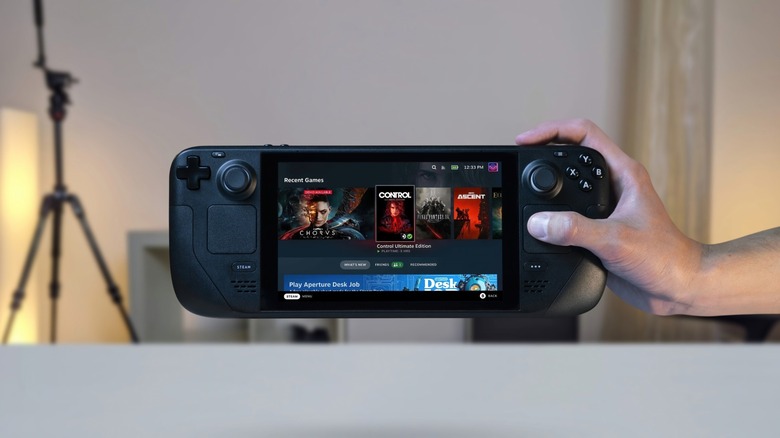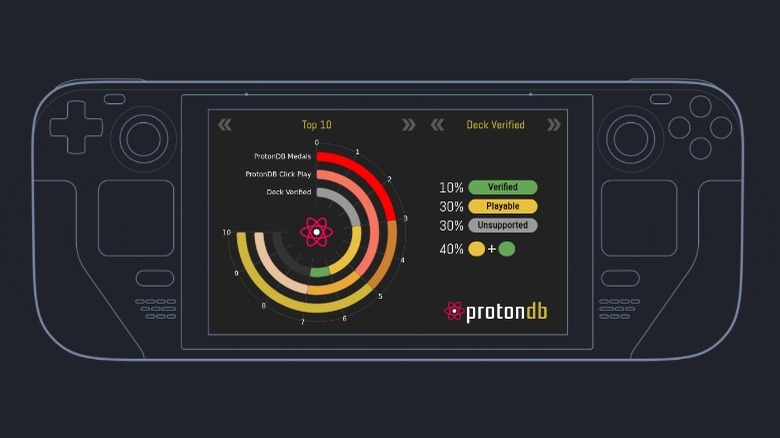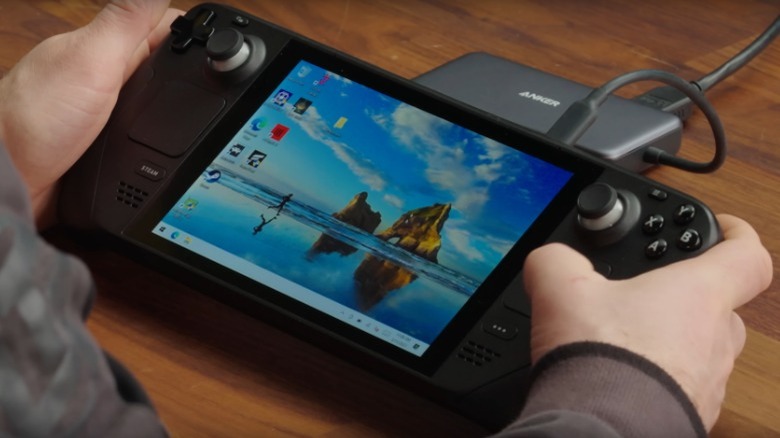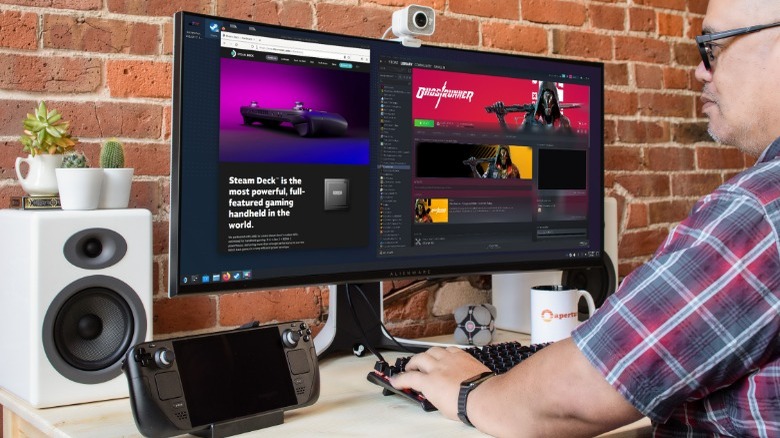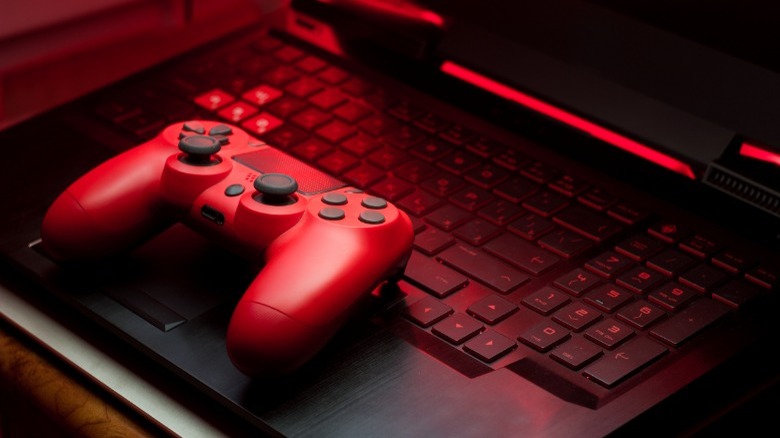5 Of The Biggest Complaints And Regrets Steam Deck Owners Have With The Portable PC
As if Valve didn't have enough fans thanks to its massive Steam gaming platform and storefront, in February 2022, it earned even more goodwill by releasing what must be one of the best-value gaming consoles in recent memory. Over the year since its release, the Steam Deck has reportedly sold over a million units and shows no sign of slowing down.
It's easy to see why gamers fell in love with the Steam Deck. Valve's competitively-priced handheld console packs an impressive amount of power and versatility into a very manageable form factor and allows PC gamers to play many of their favorite games away from their desks. The custom AMD Zen 2 APU with four CPU cores, eight threads, and eight RDNA 2 compute units strike a good balance between power and efficiency, while the large capacitive touchscreen, and abundant, customizable controls give gamers plenty of flexibility.
While it seems as though most buyers are happy with their purchase, nothing is perfect, and there were bound to be people who found issues with the Steam Deck or simply found the device to be ill-suited to their needs.
Many early adopters found issues with compatibility or software
One of the more interesting aspects of the Steam Deck is the software experience. Instead of Windows, Valve decided to develop a custom Linux distribution, called SteamOS 3.0, based on Arch Linux. The choice to run SteamOS instead of something more mainstream, like Windows, allowed Valve a lot more freedom to customize the user experience and optimize the software and hardware to work in unison. One area where this optimization can be seen in full force is the TDP (thermal design power) control that places a limit on how much power the AMD APU can draw, effectively limiting performance but dramatically extending battery life. SteamOS 3.0 has also allowed Valve to implement a rather capable desktop mode for when you want to connect the Deck to a monitor and peripherals.
While the custom experience and potential performance gains over Windows that the likes of Linus Tech Tips demonstrated are both serious boons for Valve's handheld, the software experience is far from perfect thanks to the limitations of gaming on Linux. As one Reddit user, u/212QBW complained about in a post, they experienced some troubling difficulties playing Red Dead Redemption on their Steam Deck thanks to the Proton compatibility layer that Steam uses to play Windows games on Linux. Steam has gone to great lengths to develop Proton, but it's still not perfect, and often games require significant tweaking to work properly. As is evidenced by ProtonDB, only 14% of the top 100 games on Steam are verified to work with the Steam Deck, while 29% are reportedly unsupported, and 11% are completely unplayable, having received the "Borked" medal. Not only has the custom OS led to complaints, but it adds extra research to the buying process to verify that it runs.
Putting Windows on the Steam Deck is not always a bug-free affair
One reason that the Steam Deck appeals to many hardware enthusiasts is that it's an open platform, meaning that you can install basically any operating system onto it. That being said, caveat emptor applies when it comes to unsupported configurations, and there is no shortage of unexpected behavior or glitches when using Windows 10 or 11 on the Steam Deck.
Case in point, u/gibberig, posted on the WindowsOnDeck subreddit that they regretted buying the Steam Deck because of an issue with the Wi-Fi adapter driver that caused 2000 ms ping spikes every 20 seconds. Solutions were offered in the comments, but they often involved a bit of tinkering. In the same thread, some users commented that their Deck would predictably disconnect from the Wi-Fi network every hour.
To Valve's credit, the issues mentioned in the post and the subsequent comment thread all had solutions, but it was up to the users to find and implement those solutions. Troubleshooting is never fun, but as some Reddit users pointed out, Windows is not the Deck's intended use, and regretting a purchase because of something you did to it is more than a little silly.
Some users found themselves tinkering in SteamOS rather than gaming
In a Reddit post by u/kanyeshymen21 asking whether users of the Steam Deck regretted their purchases, some users had the usual complaints about game incompatibility and weird Windows issues, but other users had some rather unusual things to say about getting distracted by tinkering in the operating system rather than actually playing a game. This is usually an area where console gaming outshines PC gaming since a console is basically plug-and-play in many ways. You generally don't have to worry about changing graphical settings to reach your desired framerate, and usually when hardware or software is incompatible, it simply doesn't work.
The Steam Deck, on the other hand, exposes a lot of customization and tinkering options to the end user, and a few users found that instead of playing games on the console, they were spending more time tinkering and tooling around in the operating system and Steam's Proton. Whether it be chasing higher framerates, or customizing the KDE Plasma desktop environment, some people simply cannot stop fiddling with the ancillary stuff and get down to business.
Some just prefer more powerful hardware or expected more from the Steam Deck
While the Steam Deck is certainly impressive, it's no replacement for a custom-built desktop with an Nvidia RTX 3090, or even a more pedestrian gaming laptop. One user on the Steam Community states that they bought a Steam Deck, but were underwhelmed by the device because of an admitted lack of research and unrealistic expectations. The games they wanted to play on the Deck were not great to play with the built-in controls, and the games that do suit the Deck well — mostly indie and retro top-down and platformers — were among the poster's least favorite games to play.
While the Steam Deck is capable of playing even some demanding triple-A titles, the gaming experience on those titles is far from high-fidelity. Usually, running demanding games on the Steam Deck requires sacrificing visual quality and limiting the framerate to as little as 40 or 30 fps, which is simply not a compromise many are willing to make. Furthermore, running more demanding games pushes the CPU and GPU hard, increasing power draw and significantly impacting battery life.
Another comment on Reddit, by SleepyAviator, mentions that they had only used the Deck for five hours since it arrived, largely due to their gaming laptop simply being faster and more practical. This isn't surprising, since the Steam Deck performs significantly worse than an Nvidia GeForce RTX 3050 Ti laptop, according to PCMag.
The immutable operating system makes things complicated
One thing you might hear when people talk about the Steam Deck is that it's "just a PC," and while that's true, it's a little different than most other PCs you may have used before. The difference in how SteamOS 3.0 works compared to Windows, macOS, or most other Linux-based operating systems comes down to the filesystem. SteamOS 3.0 is what's called an immutable operating system. As TheNewStack explains, an immutable OS operates in a "read-only" fashion, meaning users are unable to alter system files, whether through directly manipulating them or installing third-party applications. SteamOS will still allow users to install applications – but it only allows the installation of apps via flatpak. This is where u/annoyedforaliving on Reddit takes issue with the Steam Deck, stating that the immutability of SteamOS prevents the Steam Deck from operating as a fully-functional computer.
Flatpak is a safer application format on Linux-based operating systems that packages all the other information necessary for an app to run, and installs apps in an isolated manner, meaning flatpak apps don't alter other applications or the operating system when they're installed. While many apps are available as flatpaks, there are many that aren't, so it's understandable that SteamOS's immutable nature may be frustrating to some users. It also bears mentioning that you can disable the read-only mode, but it may be re-enabled the next time the system updates, which would mean losing all the non-flatpak apps installed on the device.
